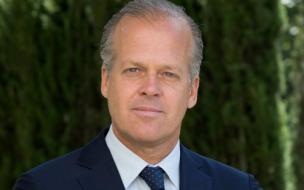A software engineer by trade with additional background in telecommunications, David is now on the lookout for finance and strategy opportunities at his current company Grifols, a major Spanish pharmaceuticals multinational. He's hoping the soft skills and financial expertise gleaned from his EMBA will also open up opportunities at major consulting firms abroad.
Despite having a clear vision of his own future, David likes to live in the present. He's currently in the middle of his program, and is preparing for study abroad trips to China and the U.S., along with all the rigors of his own role at Grifols.
Why did you decide to pursue an Executive MBA?
Since childhood, I’ve always had a passion for numbers, which led to me starting my professional career in telecoms.
However, I rapidly realised that people management and impactful decision-making were things I wanted to explore in my career. My ambition for growing professionally led me to search for an Executive MBA in a prestigious school.
What made ESADE the right school for you?
Choosing a school that matched my career aspirations and personal values was actually really difficult.
Of course, I decided on ESADE, as it has a long history of academic and professional excellence, and espouses values such as integrity, learning from diversity, and sharing for the common good.
How have you gained from your EMBA experience so far?
ESADE has enabled me to discover my true professional passion – finance. Moreover, the core EMBA curriculum covers all traditional management disciplines, enabling me to link finance to corporate strategy, marketing, social responsibility and more. This gave me a much fuller appreciation for all aspects of business.
Which tracks and specializations have you taken?
I chose the finance specialization, which covers mergers and acquisitions, financial markets and debt.
I think these are topics that can provide me all the knowledge required to redirect my career. Furthermore, I’m taking a class in B2B sales management.
What has been your favourite class so far and why?
Difficult question!
Conceptually, my favourite class was Valuation and Corporate Finance Transactions. It covered management buy-outs and let me discover how a company’s value can grow by applying the right strategies so that the investor’s IRR is maximized.
On the other hand, if I appeal to my emotions, I’d say Finance Analysis and Planning, as it’s the class where my passion for finance and strategy was kindled by the teacher, Joan Massons.
Where do you plan to go for your study abroad periods?
So far, I’ve been on one study abroad week in France, where I went to HEC Paris and learned how to manage change and transformation in organisations.
We get three opportunities to study abroad at ESADE, and I’ll be going to Shanghai next to learn how to manage growth and development in emerging markets.
My last trip will be to Georgetown University in Washington, where I hope learning about the convergence between business and politics will enable me to conduct global business more effectively.
What is the value of an EMBA to a software engineer?
Software engineering is a very specific, systematic world that rests on design, development, implementation, testing and maintenance.
Software engineers are typically analytic and can think conceptually, which are very useful skills in pursuing an EMBA.
However, soft skills are as important in management as technical knowledge, and can only be gained through executive education, making my EMBA crucial.
What should Executive MBA applicants consider when deciding on a program?
You need to consider your future classmates. Make sure they have a similar amount of experience but come from a variety of sectors so that you can learn from them.
Also consider your professional situation in terms of studying time, as some companies may not allow you the time slots you need. For example, ESADE’s EMBA is highly flexible, making it easy to find a routine that fits in with your organisation. Finally, part-time programs are travel-oriented, so you should also consider this.
What are your plans for the future?
Even as I’m seeking a new career in the field of finance and strategy, I want to finish my Executive MBA to be better-prepared for such a change. I have spoken with my current employer, Grifols, and I expect to be relocated to their finance and strategy team.
However, I wouldn’t’ reject the opportunity to work for a ‘big four’ consultancy firm if the chance arose. Such an opportunity would help maximize my learning curve through acquiring experience in different sectors.
On the other hand, I am also considering moving away from Spain to seek better opportunities.
RECAPTHA :
f7
c0
90
81







